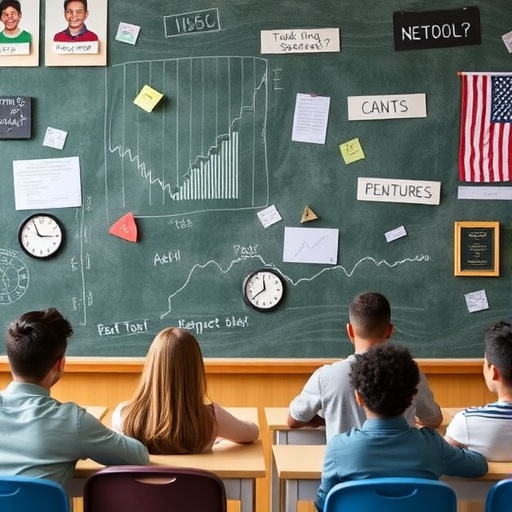In the ever-evolving landscape of education, understanding what drives students’ motivation within academic settings is crucial for enhancing learning outcomes. A systematic review conducted by Törmänen, Ketonen, and Lehtoaho dives deeply into the concept of situational motivation, presenting a comprehensive look at how different contextual factors can influence students’ engagement and achievement. This review, recently published in the Educational Psychologist Review, brings to light the intricate mechanisms through which situational motivation can be harnessed to create more effective learning environments.
Situational motivation refers to the transient drives and influences that affect an individual’s motivation level at a specific moment in time. It stands apart from intrinsic and extrinsic motivation, which are more stable and enduring forms of motivation. The authors emphasize that understanding how situational factors interact with various motivational components can lead to improved educational practices. This nuanced perspective provides educators with a framework for recognizing the elements that inspire passion and perseverance in students when faced with academic challenges.
The systematic review analyzes existing literature to identify key situational factors affecting student motivation. Environmental contexts, social dynamics, and instructional methods are examined to elucidate their roles in enhancing or impeding a student’s drive to learn. Such factors can include classroom design, teacher support, peer influences, and the overall educational atmosphere. By systematically categorizing these influences, the authors highlight the complexity of motivation and advocate for a holistic approach to fostering student engagement.
One of the significant findings of this review is the importance of positive social interactions in motivating students. When students are supported by their peers and educators, they are more likely to engage deeply with the learning material. The authors argue that fostering a collaborative classroom environment can significantly boost situational motivation, particularly among students who may struggle with self-directed learning. The integration of collaborative learning strategies not only enhances motivation but also promotes a sense of belonging among students.
Furthermore, the review delves into the role instructional strategies play in shaping motivational dynamics. The authors point out that varied instructional approaches—such as project-based learning, gamification, and the use of technology—can stimulate interest and engagement. By applying techniques that cater to different learning styles and preferences, educators can create a more inclusive atmosphere that enhances situational motivation. The linkage between instructional methods and motivational levels underscores the responsibility of educators to continuously evolve their teaching practices.
Additionally, the review discusses the implications of feedback in motivating students. Timely and constructive feedback is crucial, as it not only informs students about their progress but also reinforces their efforts. The authors highlight the necessity for educators to cultivate an environment where feedback is perceived as a tool for growth, motivating students to take ownership of their learning. By understanding the nuances of feedback mechanisms, educators can foster a culture where students feel empowered to take risks and explore new avenues of knowledge.
Another compelling aspect of the review is its exploration of the emotional components that accompany situational motivation. Emotions play a pivotal role in influencing how students react to learning experiences. The authors introduce the idea that educators should be attuned to the emotional states of their students and create experiences that evoke positive emotions. By designing lessons that elicit curiosity and excitement, educators can significantly impact students’ motivation to learn and engage with their studies.
In addition to emotional awareness, the review highlights the necessity of aligning educational goals with students’ interests and aspirations. When students see a clear connection between what they are learning and their personal goals, their situational motivation tends to increase. The authors argue that it’s essential for educators to help students make these connections, thereby paving the way for a more relevant and meaningful learning experience. This alignment not only enhances motivation but also emboldens students to pursue their interests beyond the classroom.
The review also points out the vital role of technology in shaping situational motivation. The integration of digital tools in education, such as interactive learning platforms and virtual simulations, can stimulate student interest and participation. The authors contend that technology can serve as a catalyst for engagement, enabling students to explore concepts more interactively and collaboratively. As technology continues to evolve, educators must remain adaptable and willing to innovate their teaching methods to maximize motivational potential.
While the review paints a promising picture of the possibilities for enhancing situational motivation, it also acknowledges the challenges educators face. The diverse backgrounds and experiences of students can lead to varied motivational needs. The authors stress the importance of inclusivity and equity in addressing these disparities. Educators must strive to understand the unique contexts of their students and create learning experiences that are accessible and motivating for everyone.
In conclusion, the systematic review conducted by Törmänen et al. illuminates the significant impact of situational motivation on academic learning. By dissecting various contextual influences and highlighting the importance of social interactions, instructional strategies, feedback, emotions, relevance, and technology, the authors provide a roadmap for educators seeking to enhance student engagement. This research underscores the notion that motivation is not solely an internal drive but is profoundly affected by external contexts and dynamics. Applying these insights can lead to richer educational experiences that inspire lifelong learning.
In the rapidly changing educational landscape, ongoing research like this is crucial for equipping educators with strategies to keep students motivated and engaged. As more insights emerge from studies on situational motivation, the hope is that educational practices will continue to evolve, ultimately leading to improved outcomes for all students. The task ahead is to take these findings, adapt them to various learning environments, and inspire the next generation of learners to reach their full potential.
Subject of Research: Situational Motivation in Academic Learning
Article Title: Situational Motivation in Academic Learning: A Systematic Review
Article References:
Törmänen, T., Ketonen, E., Lehtoaho, E. et al. Situational Motivation in Academic Learning: A Systematic Review.
Educ Psychol Rev 37, 56 (2025). https://doi.org/10.1007/s10648-025-10036-0
Image Credits: AI Generated
DOI: 10.1007/s10648-025-10036-0
Keywords: Situational motivation, academic learning, educational practices, student engagement, instructional strategies.




